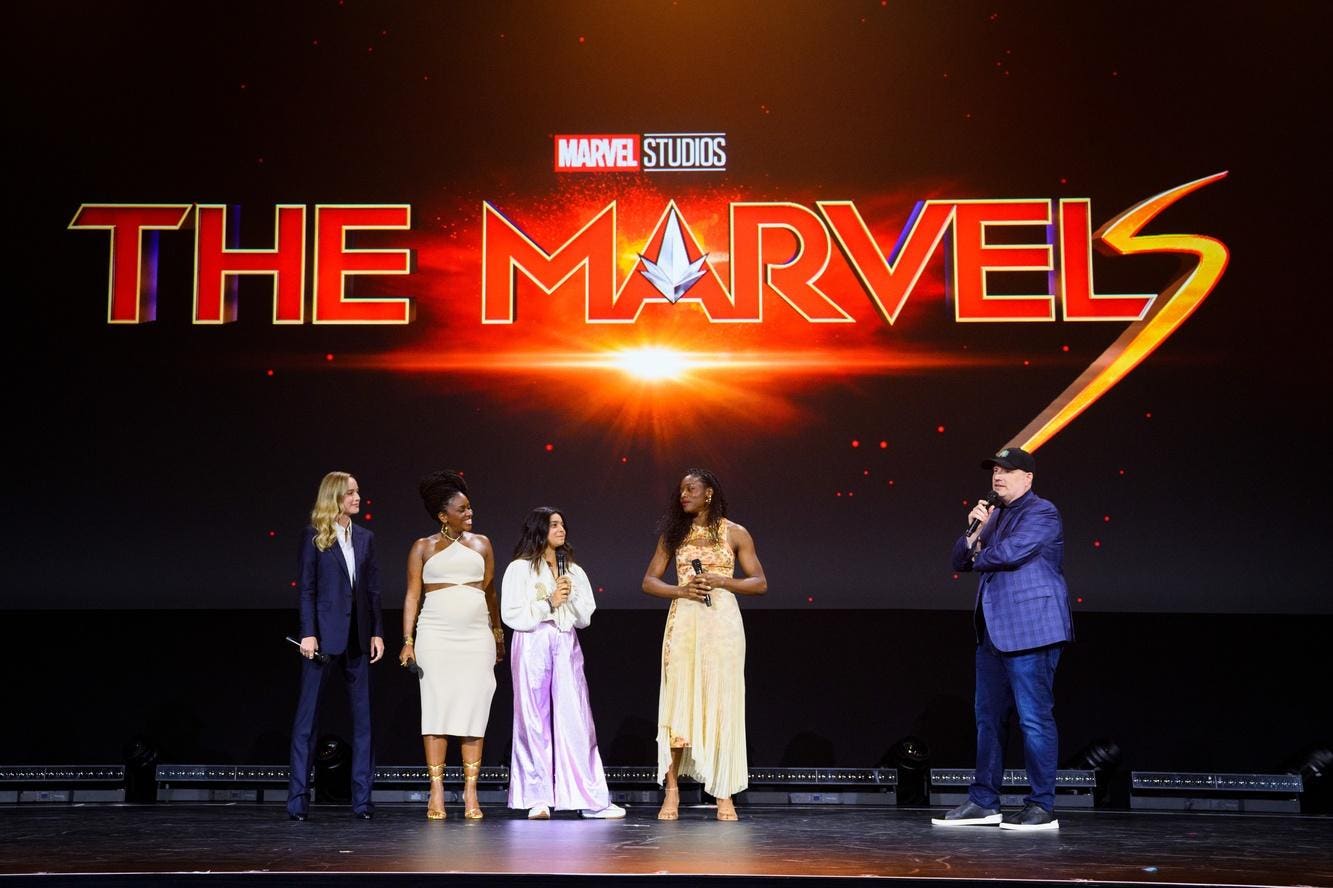The death of the Marvel Cinematic Universe has been predicted before, but this time, something really seems to have shifted, as Marvel’s latest film, The Marvels, earned an estimated $47 million at the domestic box office, the worst opening in the history of the MCU.
Compared to Captain Marvel, which opened to $153 million (domestic) and went on to earn over a billion worldwide, the MCU’s cultural dominance seems to have hit a wall.
Let’s take a look at what went wrong, and how Marvel can potentially be saved by a good supervillain.
The Marvels
The Marvels, a direct sequel to Captain Marvel, unites three superheroes; Captain Marvel (Brie Larson), Monica Rambeau (Teyonah Parris) and Ms. Marvel (Iman Vellani).
The latter pair were introduced via Marvel’s Disney+ shows, which suffer from the same issues that plague Disney’s Star Wars spin-offs, being wildly inconsistent and stuffed with increasingly dense lore; fans have complained that catching up with the story feels like “homework.”
It’s clear that the MCU has lost a lot of goodwill from fans and critics, that the endless expansion of the cinematic universe has become a burden. The slow decline of the MCU has become something of a meme online, with many rooting for the franchise to fail.
Too early for MCU nostalgia
Already, Marvel seems to have hit its nostalgia era; the final trailer for The Marvels featured vintage clips of Robert Downey Jr.’s Iron Man and Chris Evans’ Captain America, who do not appear in the film.
The film’s post-credits scene even teases a character from Fox’s X-Men franchise, now rendered in uncanny CGI, devoid of texture.
Ironically, the season 2 finale of Loki, streaming on Disney+ just before The Marvels cinematic release, drew praise and excitement from longtime fans of the franchise, who were satisfied that the original Avengers villain had concluded his long, strange character arc.
Marvel’s attempts to create a new team from more obscure comic book characters seems to have fallen flat, as fans still seem far more invested in the original characters.
Online, rumors abound that Downey Jr. and the original Avengers team will soon return to the MCU; head honcho Kevin Feige has since dismissed these rumors, but didn’t rule out the possibility.
The positive reaction to the rumor suggests that the public sees Marvel’s best days as behind it, that the franchise will never again hit the heights of the Infinity Stone saga, that Thanos and Iron Man are still the stars of the franchise.
Anecdotally, when I take my kids to see a Marvel movie they tend to have fun, but they don’t express any interest in seeing these characters again. The movie evaporates from their memory the moment they leave the cinema, like pasta water draining through a colander. Frankly, I feel the same.
The superhero landscape has evolved since the days of Infinity War and Endgame. For adults, there are more complex, cynical and violent superhero stories like The Boys and Invincible out there, pushing the genre in interesting new directions.
For families, superhero blockbusters are being overshadowed at the box office by a different kind of nostalgia; Super Mario, Barbie or Five Nights at Freddy’s (with the notable exception of Spider-Man, who still reigns supreme).
The current state of the MCU
The MCU wasn’t always a consistent box office earner, but at its height, it was a behemoth, big enough to strike fear in the heart of the legendary Martin Scorsese, who voiced concerns that cinema was being smothered by shallow superhero blockbusters.
For years, the MCU was practically an industry in itself, a franchise that completely dominated pop culture, spawning enough merchandise to coat the ocean in microplastics, supporting a wide range of content creators: critics, fan theorists, haters, and Marvel enthusiasts who explained comic book references to casual movie fans.
Even in decline, the MCU still inspires many content creators — “explainer” videos and articles have never been so necessary — but now, the haters seem to dominate the discourse, with “anti-woke” YouTubers racking up millions of views by framing the current audience disinterest as a backlash against diversity (even South Park is stealing talking points from anti-woke YouTube nowadays).
What’s really behind the decline of the MCU?
The fading relevance of the MCU has been attributed to superhero fatigue and oversaturation. The glut of TV spin-offs on Disney+ appear to have diluted the brand and created too much lore for casual fans to keep up, giving the impression that Disney is hastily churning out content.
It’s true; Marvel lore has become as dense and convoluted as a long-running anime series; did you know that Loki ascended into true godhood and currently holds the strands of reality together? That Doctor Strange grew a third eye, for some reason? Or that the Earth was a giant egg intended to birth a titanic Celestial known as Tiamut? Did you know that Harry Styles is the brother of Thanos?
Does anyone even care anymore?
The Marvel Cinematic Universe has grown so cluttered that Disney is expected to wipe the slate clean with the help of the popular, R-rated character Deadpool, using the upcoming Deadpool 3 as a cameo-filled nostalgia-fest and a timeline cleanse that resets the story back to simplicity.
Interestingly enough, the X-Men franchise did this exact same trick with Days of Future Past, but didn’t manage to maintain the quality of subsequent sequels (outside of the stellar Logan, which is kinda its own thing).
In hindsight, the sloppy, inconsistent canon of the old X-Men films seems like the smartest way to go; DC Studios best-received films (The Batman, Joker, The Suicide Squad, Birds of Prey) were either separate from the DC cinematic universe, or very loosely connected.
Kang the Conqueror is no Thanos
Variety recently delved into the many issues plaguing the MCU, and highlighted the “Jonathan Majors problem,” with the actor having been introduced as the franchise’s next big bad, Kang the Conqueror, but has since been accused of domestic violence and is soon headed to a high-profile trial in New York.
While Majors’ performance as Kang was well-received, the character’s introduction in Ant-Man 3 was viewed as underwhelming (the great conqueror was defeated by a bunch of ants). Even before Majors was accused of domestic violence, the character seemed an odd choice for the next MCU antagonist.
Kang is a relatively obscure villain who can die and respawn endlessly, because he has infinite variants. Which leads us to the next problem …
The MCU multiverse was a mistake
Marvel got into the multiverse game a little late. Rick and Morty had already thoroughly explored the concept (ironically, the show often took inspiration from Kang the Conqueror’s old comic storylines), and Everything, Everywhere, All At Once had a more insightful take on multiverse than Marvel, with a fraction of the budget.
Into the Spider-Verse had already used the idea to introduce quirky new Spider-Man variants, and emphasize that Spider-Man is more than Peter Parker. Marvel quickly copied the strategy by uniting old Spider-Men and their villains in No Way Home, to great success, but that trick can only be pulled once.
Marvel then tried to build on what came before by hiring Rick and Morty writers, but the MCU could never emulate what the animated series preached; that infinite realities leads to despair, nihilism and existential angst.
Instead, Marvel used the multiverse to heighten the stakes — now the entire multiverse was at risk, instead of the universe, but the twist had the opposite effect; nothing seemed to mean anything, because there was always another variant, or another universe to take the place of the last.
Marvel already made this mistake in Endgame, which saw a victorious Thanos killed at the beginning of the film, but sees the Avengers face off against his younger self via time travel. While Endgame was a very neat conclusion to the Infinity Saga, it wasn’t quite as satisfying to see Thanos face off against a team he has no personal history with.
A screenshot from Endgame, which sees Scarlet Witch tell Thanos that he “took everything” from her, only for him to reply “I don’t even know who you are,” became a popular meme because it was, admittedly, hilarious.
But it also showed how underwhelming that moment was, from a storytelling perspective. Thanos genuinely didn’t know who she was, because that version of him did not murder her lover, Vision.
She was murdering a variant, a stranger.
Marvel needs a strong villain to hold the MCU together
Compelling supervillains are absolutely essential to superhero stories; that’s why the Joker can star in a film without Batman.
Thanos remains an iconic MCU villain, partly because he won. He was fascinating because he genuinely believed himself to be a hero; really, he was the true protagonist of Infinity War.
Doctor Octopus, Killmonger, Mr. Freeze, Harley Quinn, Homelander, Omni-Man; these villains are often far more interesting and complex than their superhero rivals. They keep the momentum going, give the audience someone to root against (and even sympathize with, to some degree).
Thanos also kept the MCU simple; he was essentially a video game boss, collecting all the gems so he could enact his plan. Casual viewers didn’t need to do homework to understand the threat, and they got to know him in Infinity War, where he instantly made a strong impression by beating the Hulk in a fist-fight and murdering Loki.
He wasn’t defeated by ants, and while there was a variant to take his place, there wasn’t an infinite amount of Thanos clones out there. He was just a big purple guy with an unhinged (but earnest) ideology, and a cool weapon.
The MCU could solve many of its problems by establishing a strong, singular villain as a tentpole that unites all of the new characters, and clears the clutter.
Clearly, the answer is Doctor Doom.
Doctor Doom could save the MCU
Doctor Doom is wildly popular, and widely recognized outside of comic book fandom. The character is so iconic that it seems absurd that he wasn’t chosen as the next big bad to inherit Thanos’ crown.
Doom has reportedly been considered as a replacement for Kang; Disney would surely be missing a major opportunity if they don’t embrace the evil of Doctor Doom.
Like Thanos, Doctor Doom earnestly views himself as the hero of the universe. He has an interesting backstory, an iconic look, and is dangerously intelligent, able to make a good argument for his villainous plans.
With the right casting, Doom could be the next genius that dominates the MCU, the inverse Iron Man that keeps viewers coming back.
Without Doom, the MCU seems doomed to fail.
Read the full article here





